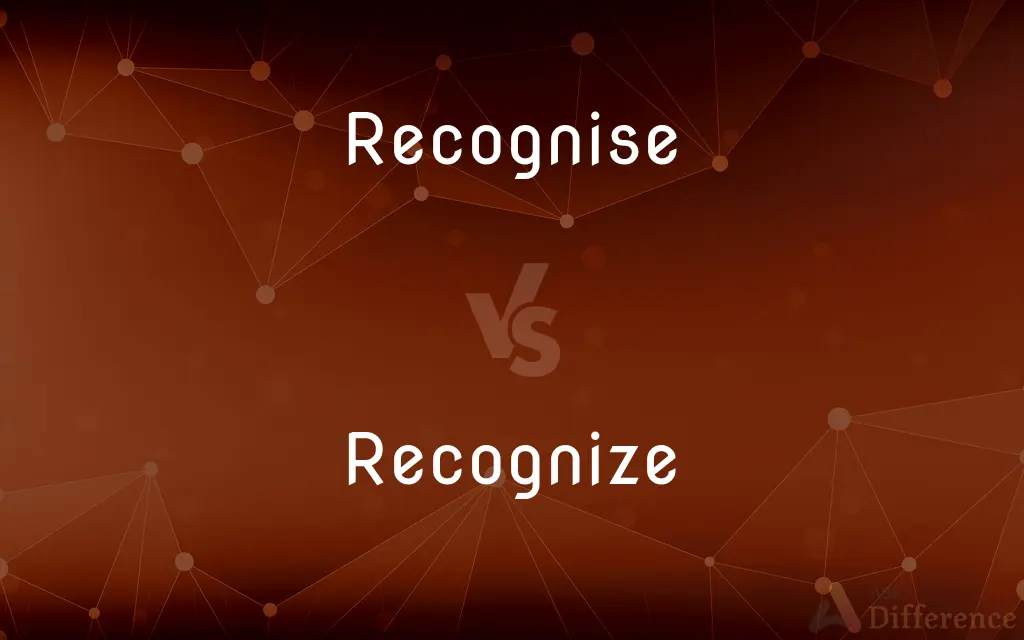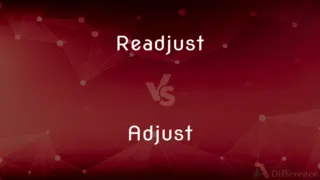Recognise vs. Recognize — What's the Difference?
By Urooj Arif & Maham Liaqat — Updated on March 20, 2024
"Recognise" and "Recognize" are variations of the same word, with "Recognise" being preferred in British English, while "Recognize" is favored in American English.

Difference Between Recognise and Recognize
Table of Contents
ADVERTISEMENT
Key Differences
The primary difference between "recognise" and "recognize" lies in their usage across different English-speaking regions. "Recognise" is commonly used in British English, reflecting the spelling conventions of the UK and other countries that follow British English standards. On the other hand, "Recognize" is the preferred spelling in American English, used in the United States and countries that lean towards American English conventions.
Both spellings refer to the act of identifying something or someone previously seen, known, or heard, or to acknowledge the validity or legality of something. The choice between "recognise" and "recognize" does not affect the meaning of the word; it merely reflects regional spelling preferences.
The distinction between the two extends to other derivatives of the word, such as "recognition" (which follows the same regional spelling variations as "recognise/recognize"). This pattern of spelling variation is observed in several other words in English that end in "-ise" in British English and "-ize" in American English.
Educational systems and publications in respective regions uphold the spelling conventions, teaching and using the form that corresponds with their version of English. For instance, British schools teach "recognise," while American schools teach "recognize."
The choice of spelling can sometimes indicate the intended audience or the origin of a piece of writing. Authors and publishers typically select the spelling that aligns with their or their target audience's regional language conventions.
ADVERTISEMENT
Comparison Chart
Spelling Region
British English
American English
Usage
UK, Australia, New Zealand, and other regions following British English
United States and other regions following American English
Meaning
To identify someone or something seen or known before; to acknowledge validity
Same as "recognise"
Derivatives
Recognition, recognisable, etc.
Recognition, recognizable, etc.
Indication
Preference for British English conventions
Preference for American English conventions
Compare with Definitions
Recognise
Used in acknowledging.
The law must recognise the rights of minorities.
Recognize
American English spelling.
I didn't recognize her at first in her costume.
Recognise
In context of familiarity.
It's hard to recognise this place after so many years.
Recognize
Accepting truth or validity.
We must recognize the impact of climate change on our planet.
Recognise
Identifying previously known.
Did you recognise the song that was playing?
Recognize
Identifying from past encounters.
Can you recognize the difference between these two pictures?
Recognise
Acknowledging validity.
We need to recognise the importance of mental health.
Recognize
Relating to identification.
Facial recognition software can recognize individuals in a crowd.
Recognise
British English spelling.
I didn't recognise him with his new haircut.
Recognize
Used in official acknowledgment.
The organization will recognize volunteers with awards.
Recognise
Standard spelling of recognize
Recognize
To know to be something that has been perceived before
Recognize a face.
Recognise
Show approval or appreciation of;
My work is not recognized by anybody!
The best student was recognized by the Dean
Recognize
To know or identify from past experience or knowledge
Recognize hostility.
Recognise
Grant credentials to;
The Regents officially recognized the new educational institution
Recognize an academic degree
Recognize
To perceive or show acceptance of the validity or reality of
Recognizes the concerns of the tenants.
Recognise
Detect with the senses;
The fleeing convicts were picked out of the darkness by the watchful prison guards
I can't make out the faces in this photograph
Recognize
To permit to address a meeting
The club's president recognized the new member.
Recognise
Express greetings upon meeting someone
Recognize
To accept officially the national status of as a new government.
Recognise
Express obligation, thanks, or gratitude for;
We must acknowledge the kindness she showed towards us
Recognize
To show awareness of; approve of or appreciate
Recognize services rendered.
Recognise
Be fully aware or cognizant of
Recognize
To admit the acquaintance of, as by salutation
Recognize an old friend with a cheerful greeting.
Recognise
Perceive to be the same
Recognize
(Law) To enter into a recognizance.
Recognise
Accept (someone) to be what is claimed or accept his power and authority;
The Crown Prince was acknowledged as the true heir to the throne
We do not recognize your gods
Recognize
(Biology) To exhibit recognition for (an antigen or a substrate, for example).
Recognize
(transitive) To match (something or someone which one currently perceives) to a memory of some previous encounter with the same person or thing.
I recognised his face immediately, although his voice was different.
Recognize
(transitive) To acknowledge the existence or legality of; to treat as valid or worthy of consideration.
The US and a number of EU countries are expected to recognize Kosovo on Monday.
Recognize
To acknowledge or consider (as being a certain thing or having a certain quality or property).
Slavery is widely recognized as immoral.
I recognize that my behaviour has been unacceptable.
Recognize
(transitive) To realize or discover the nature of something; apprehend quality in.
Recognize
(transitive) To show formal appreciation of, as with an award, commendation etc.
His services were recognized in a testimonial.
The soldier was recognized in dispatches.
Recognize
(obsolete) To review; to examine again.
Recognize
(obsolete) To reconnoiter.
Recognize
(immunology) To have the property to bind to specific antigens.
Recognize
To cognize again
Recognize
To know again; to perceive the identity of, with a person or thing previously known; to recover or recall knowledge of.
Speak, vassal; recognize thy sovereign queen.
Recognize
To avow knowledge of; to allow that one knows; to consent to admit, hold, or the like; to admit with a formal acknowledgment; as, to recognize an obligation; to recognize a consul.
Recognize
To acknowledge acquaintance with, as by salutation, bowing, or the like.
Recognize
To show appreciation of; as, to recognize services by a testimonial.
Recognize
To review; to reëxamine.
Recognize
To reconnoiter.
Recognize
To enter an obligation of record before a proper tribunal; as, A B recognized in the sum of twenty dollars.
Recognize
Accept (someone) to be what is claimed or accept his power and authority;
The Crown Prince was acknowledged as the true heir to the throne
We do not recognize your gods
Recognize
Be fully aware or cognizant of
Recognize
Detect with the senses;
The fleeing convicts were picked out of the darkness by the watchful prison guards
I can't make out the faces in this photograph
Recognize
Perceive to be the same
Recognize
Grant credentials to;
The Regents officially recognized the new educational institution
Recognize an academic degree
Recognize
Express greetings upon meeting someone
Recognize
Express obligation, thanks, or gratitude for;
We must acknowledge the kindness she showed towards us
Recognize
Exhibit recognition for (an antigen or a substrate)
Recognize
Show approval or appreciation of;
My work is not recognized by anybody!
The best student was recognized by the Dean
Common Curiosities
Are "recognise" and "recognize" interchangeable?
Yes, they are interchangeable, but the choice depends on the regional English being used.
Why do British and American English have different spellings for the same word?
These differences have evolved over time due to preferences in language standardization and usage in each region.
Is one spelling more correct than the other?
No, the correctness depends on the regional spelling conventions being followed.
Does the spelling variation affect the pronunciation?
No, both spellings are pronounced the same way.
How should I choose which spelling to use?
Choose based on the convention of the English (British or American) you are using or the preference of your audience.
Do dictionaries list both spellings?
Yes, most comprehensive English dictionaries list both spellings and note the regional usage.
How do international publications handle these differences?
They usually choose one form of English to maintain consistency throughout their publications.
Are there other words with similar British and American spelling differences?
Yes, words like "organise/organize," "realise/realize," and "apologise/apologize" follow the same pattern.
Can using one spelling over the other change the meaning of a sentence?
No, the meaning remains the same regardless of the spelling.
Can the choice of spelling reflect the writer's nationality?
Often, yes, it can indicate whether the writer uses British or American English as their standard.
Share Your Discovery

Previous Comparison
Wasted vs. Drunk
Next Comparison
Readjust vs. AdjustAuthor Spotlight
Written by
Urooj ArifUrooj is a skilled content writer at Ask Difference, known for her exceptional ability to simplify complex topics into engaging and informative content. With a passion for research and a flair for clear, concise writing, she consistently delivers articles that resonate with our diverse audience.
Co-written by
Maham Liaqat













































